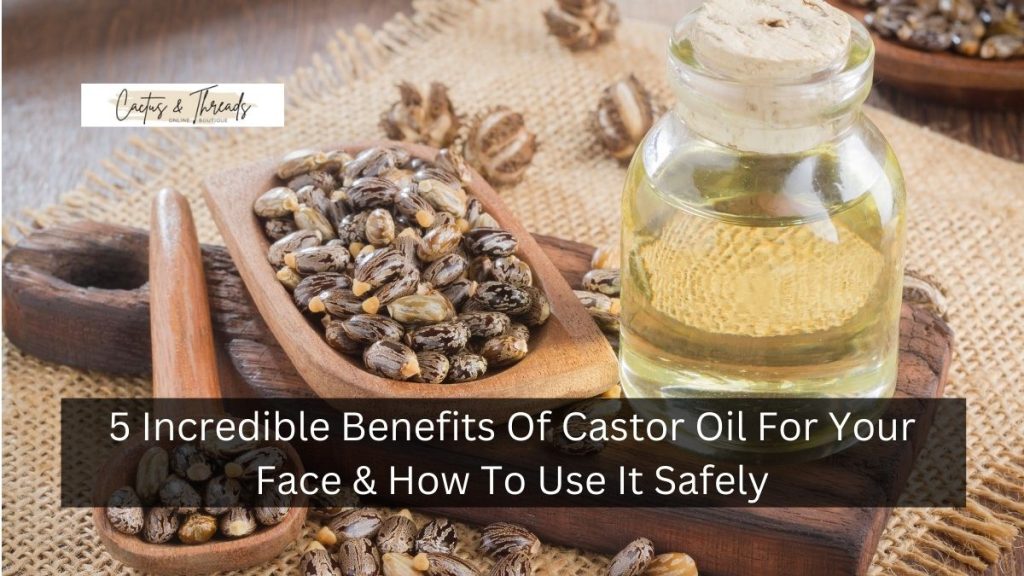
Although castor oil is well known for its many applications, including health treatments and scalp massages, did you know that it may also be good for your skin? Castor oil, which is extracted from the seeds of the Ricinus communis plant, has high concentrations of essential fatty acids and ricinoleic acid, which may have a number of skincare benefits.
Here, we go over the advantages of castor oil for face skin, its proper usage, & things to think about before adding it to your skincare regimen .
What Is Castor Oil?
Castor oil is a vegetable oil derived from castor beans. These seeds contain ricin, a toxic enzyme, but through processing, this toxin is removed, making the oil safe for topical and minimal internal use.
Castor oil has a long history and was first used to treat eye discomfort in ancient Egypt. It is still a common natural medicine today. Because of its thick viscosity and abundance of healthy fatty acids and antioxidants, it is frequently used in skincare products.
Benefits Of Castor Oil For The Face
Castor oil’s unique properties provide specific benefits for facial skin, especially for those seeking natural skincare solutions.
1. Provides Deep Moisturization
The capacity of castor oil to fully hydrate and moisturize the skin is one of its main advantages. Because of its high fatty acid content, the oil can permeate the skin and provide a barrier that prevents moisture loss.
For dry skin types, castor oil is very helpful since it softens and smoothes the skin. It can help maintain a more nourished & glowing complexion by moisturizing and retaining moisture.
2. Offers Antibacterial Protection
Research shows that the protein extracts in castor seeds provide castor oil its antimicrobial qualities. Staphylococcus aureus & other germs that cause acne have been demonstrated to be inhibited by these extracts.
Castor oil is a good choice for those with acne-prone skin because of its antibacterial properties, which can help prevent outbreaks. However, because it is rather thick, it should be used sparingly.
3. May Reduce Fungal Infections
Castor oil’s properties may also offer relief for those dealing with mild fungal infections. Research reveals that castor oil can inhibit Candida albicans – a fungus responsible for conditions like oral thrush, athlete’s foot, and certain skin infections.
While castor oil is not a substitute for medical antifungal treatments, using it alongside prescribed treatments may improve the condition by maintaining hydration and preventing irritation.
4. Helps Calm Inflamed Skin
Castor oil’s ricinoleic acid has analgesic and anti-inflammatory properties that make it effective at reducing skin redness and irritation. Animal experiments have shown that castor oil can lessen pain and edema.
Anecdotal evidence suggests that it can help soothe irritated skin, which makes it useful for psoriasis and eczema when applied properly, however additional human research is required.
5. Soothes Sunburn
Castor oil is perfect for sunburn relief because of its anti-inflammatory and hydrating qualities. It promotes skin hydration and relaxation, which may lessen sunburn discomfort. A tiny quantity applied to afflicted regions may ease discomfort and hasten healing.
Is Castor Oil Good For Skin Rashes?
Because of its hydrating and anti-inflammatory properties, castor oil has showed potential as a treatment for skin rashes. Despite the paucity of scientific evidence, castor oil helps many people with skin rashes.
Responses might differ, though, and it’s crucial to speak with a healthcare provider, particularly if you have a severe rash or sensitive skin.
How To Use Castor Oil On The Face
Due to its thick consistency, castor oil can be challenging to apply directly to the skin. To use it effectively, here’s a step-by-step guide:
- Cleanse your face to remove any makeup or impurities.
- Soak a cotton ball in a small amount of castor oil.
- Apply gently by dabbing the cotton ball over your face and neck.
- Massage the oil in circular motions for 3-5 minutes.
- Rinse with a mild cleanser to remove excess oil.
For optimal results, consider blending castor oil with lighter carrier oils like jojoba or coconut oil, which help dilute its potency and enhance its application.
Castor Oil For The Face: DIY Recipes
Explore these DIY recipes to incorporate castor oil into your skincare routine safely.
1. Castor Oil Makeup Remover
Ingredients:
- 2 tablespoons castor oil
- 3 tablespoons coconut oil
- 8 drops lavender essential oil (optional)
- 1 teaspoon vitamin E oil (optional)
Instructions:
- Mix all ingredients and let the mixture sit for 10 minutes.
- Transfer to an airtight container.
- Apply as needed to remove makeup while nourishing the skin.
2. Castor Oil Face Mask
Ingredients:
- 2 teaspoons castor oil
- 1 egg yolk
- 2 tablespoons honey
Instructions:
- Whisk the egg yolk until frothy, then add the castor oil and honey.
- Mix well, then apply to your face, letting it dry for 10-15 minutes.
- Rinse with lukewarm water for a rejuvenated, hydrated glow.
3. Castor Oil Lip Balm
Ingredients:
- 1 teaspoon castor oil
- 1 teaspoon canola oil
- 1 teaspoon jojoba oil
- 1 drop lemon essential oil (optional)
Instructions:
- Mix the oils and pour the blend into a roller bottle.
- Shake well and apply to the lips as needed.
Side Effects Of Castor Oil On The Face
While castor oil offers various benefits, it may cause some side effects, particularly for sensitive skin types. Noted side effects include:
- Skin Irritation: Animal studies indicate that undiluted castor oil may cause mild to severe irritation. Human trials suggest it is generally safe, but those with skin sensitivities may experience redness or irritation.
- Clogged Pores: Castor oil’s thick consistency can sometimes clog pores, aggravating conditions like acne. To avoid this, mix castor oil with a lighter carrier oil.
- Eye Irritation: If it enters the eyes, castor oil can cause mild irritation. Exercise caution when applying near the eyes and use sparingly.
Precautions When Using Castor Oil
To ensure a positive experience with castor oil, keep these precautions in mind:
- Conduct a Patch Test: Test the oil on a small skin area first to check for any allergic reaction or irritation.
- Consult Your Doctor: If you have underlying skin issues or allergies, consult a dermatologist before adding castor oil to your skincare routine.
- Read Labels Carefully: Look for high-quality, cold-pressed castor oil without additives, preservatives, or fragrances that could irritate the skin.
Note: Pregnant or breastfeeding individuals should also seek medical advice before using castor oil.
Final Thoughts
Because of its rich, nourishing qualities, castor oil is a great addition to skincare regimens, particularly for people with sensitive or dry skin. When used correctly, castor oil has several skin advantages, ranging from treating fungal infections to hydrating & calming sunburns.
To avoid negative effects, do a patch test, mix it with lighter oils, and stay away from sensitive regions like the eyes. Castor oil can give you softer, smoother, and more resilient skin if you use it consistently and mindfully.




